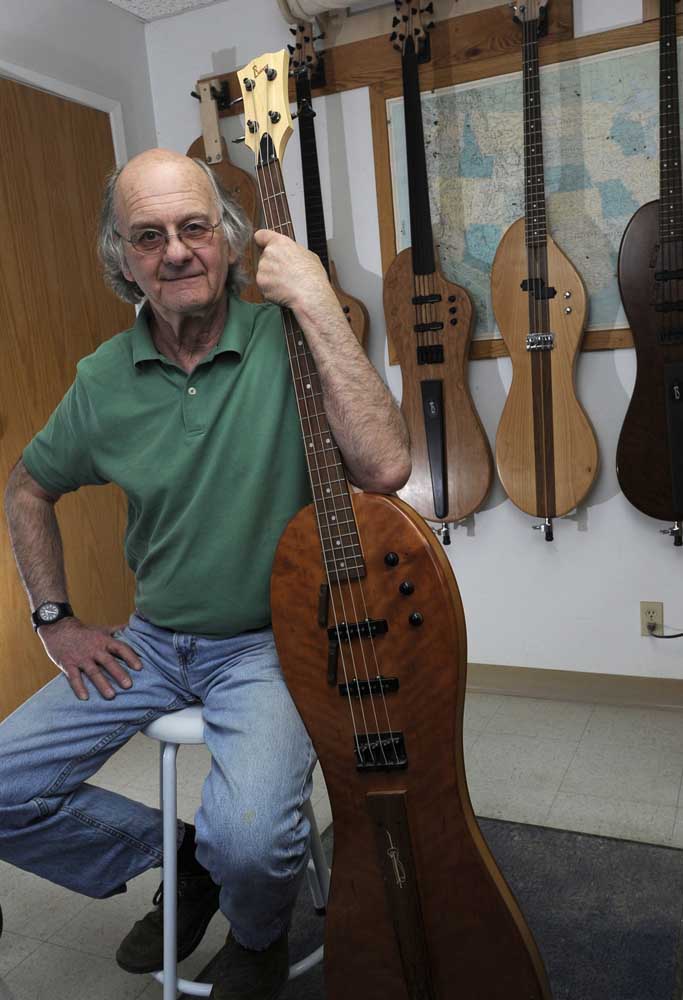The many lives of Lee Barker collected in memoir ‘Plausible Gumption’
Published 4:00 am Tuesday, October 31, 2023

- Lee Barker
Longtime Redmond residents know Lee Barker. But how they know him can vary wildly.
Some know Lee from his early days as a radio disc jockey, others know him as Lee the woodworker, or Lee the musician, or as the guy who drives go-karts in Redmond parades. Maybe they know Lee the newspaper columnist, Lee the homebuilder, or Lee the instrument inventor. Maybe they know him as Lee Barker, the guy with a microwave in his tree.
If you want to know all the Lees, you can meet them in Barker’s new memoir “Plausible Gumption.” The self-published work is available locally on the shelves of Herringbone Books or online at Amazon and other retailers.
Barker, 77, started writing his memoir as a way to collect his life story for his six grandchildren. A weekly writing group helped Barker slim and shape the family narrative into something that he felt the public could appreciate.
“I had no point to make,” said Barker. “I just thought if I tell the story I will have done my job.”
Finding satisfaction
Showing up and doing the job has defined Barker’s adult life. He begins “Plausible Gumption” with his childhood fascination with work of all kinds, and ends it with his retirement from carpentry and instrument making. The core of the book finds Barker dabbling in numerous careers and finding a sense of satisfaction in each of them.
But it also includes some surprising digressions — “random, small collisions” as a friend of Barker’s calls them.
One such collision occurred in 1963 when Barker, on a whim, took a train from Salt Lake City to Washington, D.C. for an NAACP march.
A few days later, Barker found himself looking toward the Lincoln Memorial and listening to Martin Luther King, Jr. speak about a dream he had. Being there, in person, for a defining moment in American history left a lasting impression on him.
“It has informed my life, no question about it,” he said.
Delighting in those diversions, both in the memoir and in his career, was something Barker had to learn to appreciate. His parents lived through the Great Depression and they valued hard work and ingenuity, but they also valued safety and avoiding risk.
“I was taught to consider all the possibilities and not do any of them,” said Barker. “I think I overcame some of that childhood stuff.”
A Redmond welcome
Much of the book takes place in Redmond, where Barker has lived since the early 1980s. At the time he arrived, Redmond had about 7,000 residents and Barker had recently been pushed out of the radio business.
Despite arriving at a low point in his career, Redmond opened its arms to him.
“I learned how a town could be inviting and accepting,” said Barker. “It was a place where I really felt good about raising my sons. I just felt welcome and valued.”
And job opportunities proved plentiful. Barker started building homes in the fast-growing town and soon purchased the old Redmond ice house, just a stone’s throw from the railroad tracks. He stopped framing homes and opened his own business, Great Ned! Woodworking. His humorous and surreal ads were found weekly in the pages of The Spokesman and his business began to flourish. Barker found other ways to have fun, playing for a succession of bands at churches and bars throughout the area.
Music at heart
His two loves of woodworking and music combined in 2003 when Barker invented and built something completely new. He called the vertically-oriented, wooden, electric instrument the Barker Bass. It took part of the music world by storm, and he schlepped his invention across the country to trade shows and industry events.
“It was the adventure of a lifetime,” said Barker. “I realized that I had something unique in the purest sense of the word. What I had no sense of was the barriers to some people buying it.”
He built 2,400 of them from his Redmond shop and the instruments have found their way to stages all over the world. Bassists from all sorts of genres, from Yanni to The Cure, have become proponents of it. Rarely resold, a Barker Bass often fetches more than $5,000 on the open market.
Barker himself has long stopped making the instruments and also stopped playing music.
Years of playing, in addition to throwing hammers and woodworking, have taken a toll on his hands.
“(Music) is in my rearview mirror,” said Barker. “And when I look there, it’s only good stories.”
Barker’s working life is also part of his past. He sold his business to a son and he rarely shows up to his old office anymore.
“He assured me there would always be a workbench for me,” said Barker. “It was pretty easy to give up the woodworking, but I couldn’t give up making things with my hands.”
He scratches that itch, even in retirement, by building goofy cycle karts for local parades and welding Rube Goldberg-inspired art for his front yard and in buildings throughout the city. He also plays mentor to a 10-year-old boy, the son of friends, who comes once a week to tinker and build stuff in the garage.
And now he’s trying his hands at writing. In addition to the memoir, Barker has been working on a short story collection and hopes to publish some of his fiction in 2024.









